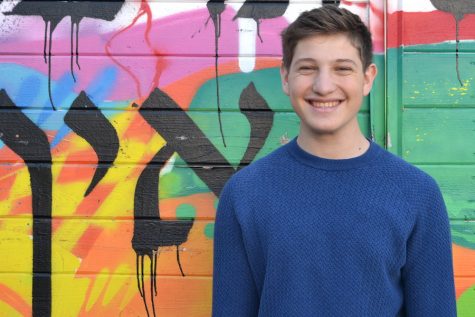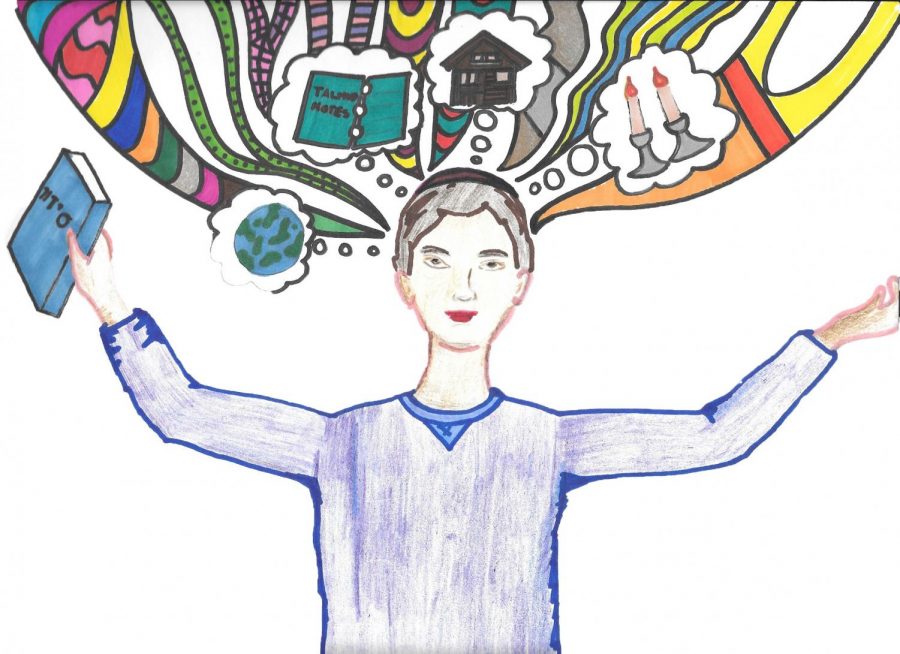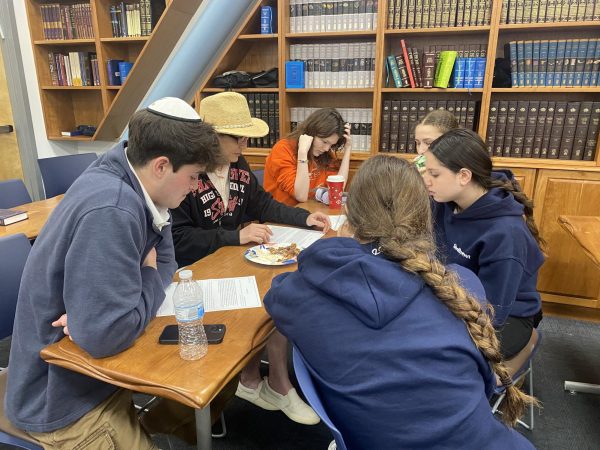Poll shows most students believe in God, search for meaning
For most Shalhevet students, belief in God is a given, and after they’ve been here for a while, they are likely to believe in God even more.
That’s what an anonymous paper poll of 104 students, taken on Oct. 26 during breakfast, showed when students responded to questions about their belief in God. A few don’t believe, and others aren’t sure.
Almost 87 percent of students said they believed in God, while 10 percent were not sure and 3 percent did not believe. Asked whether their time at Shalhevet had changed that, around 28 percent of students said they believed more now than when they arrived at Shalhevet, while 11 percent believe less. Sixty percent said their belief has stayed the same.
 BP Graphic by Gilad Spitzer
BP Graphic by Gilad Spitzer
Students described their reasons for believing in the comments section of the poll, and their answers varied. Most took advantage of the poll’s being anonymous and did not provide their names voluntarily at the end.
“Just seems obvious to me,” wrote one person.
“God inspires me to be a better person,” wrote another.
”God is a higher power that we cannot understand fully because we as humans cannot see the ultimate truth or the bigger picture,” wrote a third.
Three students said they did not believe, and of those, one was willing to be interviewed, though he wished to keep his identity private.
He said he couldn’t believe because there is no proof.
“I can’t push myself to believe something of which I have no evidence,” he said.
Another who didn’t give his or her name said the events of the world were random.
“God doesn’t exist,” that person said. “I believe that the world is ruled by circumstance. There is no higher power.”
When polled, 67 of the 104 responders agreed with the statement that God created the world and gave Jews the Torah, 15 agreed that God created the world but the people wrote the Torah inspired by God, 59 said that God created the world and cares about all people, and 29 thought that God inspires them to be better people.
Forty said that God inspires them to follow mitzvot (commandments). And out of everyone polled, not a single one agreed with the statement that God created the world but does not care about ritual mitzvot.
“Not sure if God is one thing. I don’t think we know what God really is.
— Anonymous 9th grader who is now considering believing
Shalhevet administrators were pleased with the poll results, while adding that relationships with God are evolving and vary for each student.
“I certainly see it as an affirmation of what we are doing here,” Head of School Rabbi Ari Segal said in an interview. “It makes me very happy to hear that for the most part Shalhevet is moving students in a really great direction.
“But I am also aware that you’re all 14 through 18 and it’s a long journey and I’d like to prepare you for that relationship with God when you’re 40 also and when you’re 60.”
He also said that while the poll showed Shalhevet’s role in developing students’ faith, other factors contribute too.
“I think Shalhevet and the way we and [the poll] certainly would seem to support that,” Rabbi Segal said. “But I’m sure there are also lots of factors like camps and shuls and people’s home lives and the students themselves.”
Asked what affected their beliefs in God the most, 41 students said Judaic studies classes, 14 said world events, 29 said home life and 20 responded ‘other.’
Senior Noa Kligfeld experiences a relationship with God every day.
“I think that God is like a built-in therapist,” Noa said in an interview, “who I talk with about my day and what is going on, my life and sometimes when I am davening I meditate about my life and it’s like imagining me talking to someone.”
Senior Kira Faerstain connects by praying in English instead of Hebrew. “I daven in English and I also say a lot of things to myself instead of with the minyan and I just really like it that way,” Kira said.
One freshman who answered the poll did not believe in God when coming into Shalhevet, but is considering the possibility.
“God inspires me to be a better person.
— Anonymous Shalhevet student
“Not sure if God is one thing. I don’t think we know what God really is,” he or she wrote in the comments section on the poll.
The 11th grader who doesn’t believe in God said that some people’s belief was due to indoctrination and was not genuine.
“They accept things for the way they are, not something that they truly believe in just because they were raised in a certain environment,” he said. “What I realized was that I wasn’t like that and I’m not blaming those people but I just don’t want to be like them.”
Noa Kligfeld disagreed.
“Of course growing up in a Jewish setting helps you find a connection to God, but I don’t think it’s brainwashing,” Noa said. “I think that when you grow up in a setting where you learn about God and hear about it, it makes it easier to form your own connection.”
Rabbi David Block, Assistant Principal for Judaic Studies, said it’s normal for students to have different views of God from one another at different times.
“From an educational perspective, we obviously as a Modern Orthodox school believe that deepening our relationship with God is a value,” Rabbi Block said. “I am not saying that you need to believe in God to practice Orthodoxy or to believe in God to be Jewish, but I’m saying that the theology of Orthodoxy puts God at its center.”
“I can’t push myself to believe something of which I have no evidence.”
— Anonymous 11th grader who does not believe in God
He said he is proud of the poll results.
“Hearing that something we do worked is really valuable,” he said, “I would venture to guess that if you were to poll those students, the way in which their relationship with God deepened is probably different for each student.”
According to the poll, Judaic Studies classes and world events helped form some students’ belief in God. So did different kinds of religious experiences.
Kira Faerstain has attended Camp Ramah for two summers.
“I wasn’t used to davening with boys and girls all together and watching girls lain, but after going through it and being a part of it, it just felt like a family and everyone was so connected,” said Kira. “It was a lot different from Modern Orthodox. It was a new experience that really impacted me in way that I never thought possible.”
Rabbi Segal said that he wants Shalhevet to help students prepare for a relationship with God for later in life. Equally important to students’ belief in God is their search for connection.
“If you told me lots of students don’t believe in God, I’d only be sad because when you believe in God and you feel like you can have that relationship, I think it adds meaning to your life,” he said. “I think we get lots of students who believe deeply in the search for truth and answers. As long as you’re engaged in the question, to me that’s the most important thing. ”
Co-Editor-in-Chief Clara Sandler and staff writer Caleb Fishman contributed to this story.

Nicholas Fields has been a member of the Boiling Point since freshman year. Starting off with a story about freshman orientation, he quickly fell in love with journalism. After serving as a staff writer for over a year, Nicholas became the Arts and Culture editor in his second semester as a sophomore and served as Torah editor as a junior. He is currently the Managing Editor of the Boiling Point, helping both the web and print teams. Outside of Boiling Point, Nicholas is a co-founder of the Astronomy Club, and a member of the Etta youth board and Shalhevet Model Congress team.












